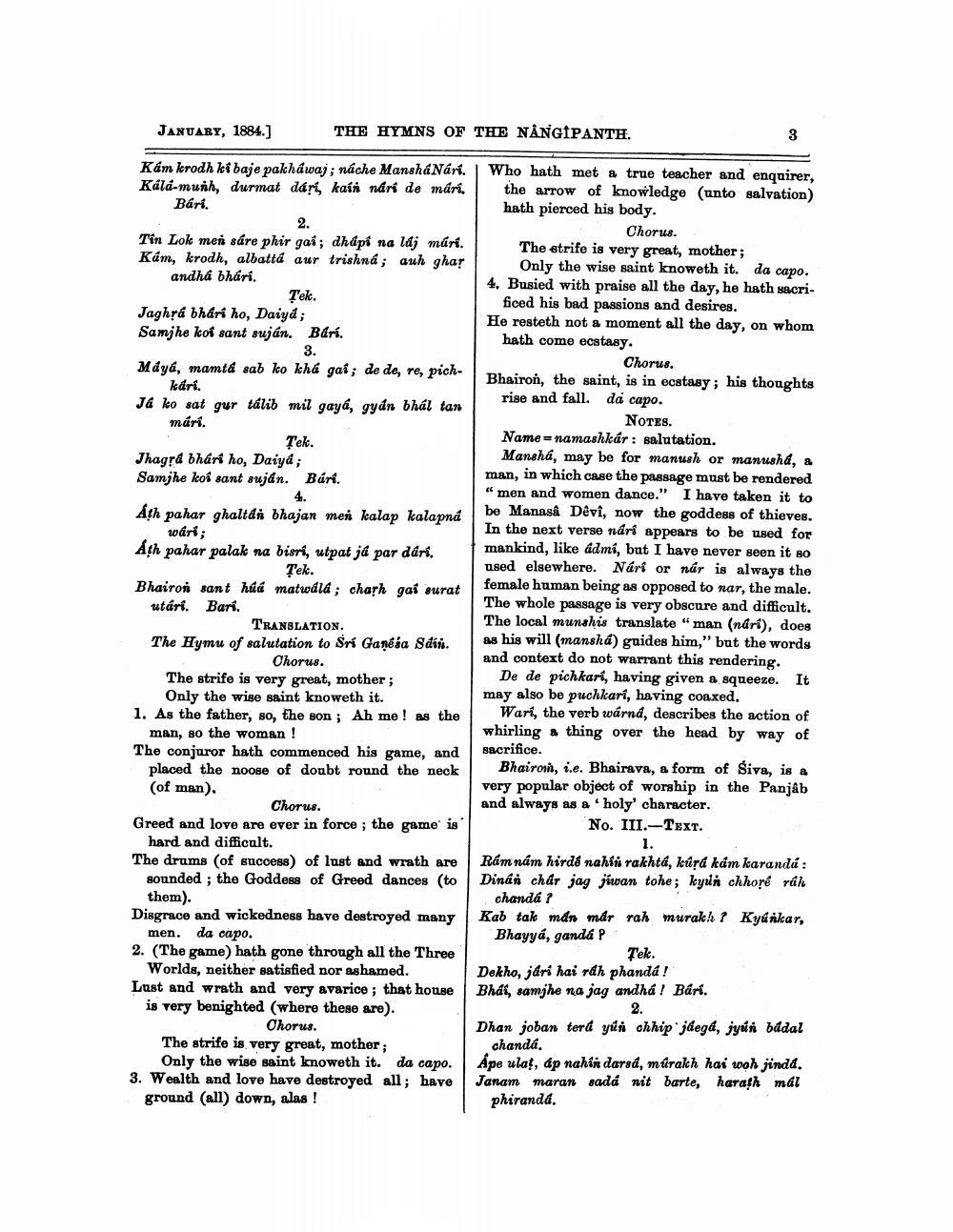Book Title: Indian Antiquary Vol 13 Author(s): John Faithfull Fleet, Richard Carnac Temple Publisher: Swati Publications View full book textPage 9
________________ JANUARY, 1884.) THE HYMNS OF THE NÅNGIPANTH. Kám krodh ki baje pakhawaj; náche Mansha Nári. Who hath met & true teacher and enquirer, Kálá-muih, durmat dari kain ndri de mári. the arrow of knowledge (unto salvation) Bári. hath pierced his body. Chorus. Tin Lok men sáre phir gai; dhápi na laj mári. The strife is very great, mother; Kám, krodh, albatta aur trishná; anh ghar Only the wise saint knoweth it. da capo. andhá bhárí. 4. Busied with praise all the day, he hath sacriTek. ficed his bad passions and desires. Jaghrá bhari ho, Daiyd; He resteth not a moment all the day, on whom Samjhe koi sant suján. Bári. hath come ecstasy. 3. Chorus. Maya, mamtả sao ko khá gas; de de, re, pich- | Bhairon, the saint, is in ecstasy; his thoughts kari. rise and fall. da capo. Jå ko sat gur tálib mil gayá, gyán bhál tan mári. Notes. Tek. Name = namashkár : salutation. Jhagrd bhari ho, Daiya; Mansha, may be for manush or manusha, a Samjhe koi sant suján. Bári. man, in which case the passage must be rendered " men and women dance." I have taken it to Ath pahar ghaltai bhajan men kalap kalapná be Manasa Dêvî, now the goddess of thieves. ๒๕ฟ; In the next verse nári appears to be used for Ath pahar palak na bisri, utpat já par dårl. mankind, like ádmí, but I have never seen it so Tek. used elsewhere. Nári or nár is always the Bhairon sant húá matudlá; chash gai surat female human being as opposed to nar, the male. utári. Bari. The whole passage is very obscure and difficult. TRANSLATION. The local munshis translate "man (ndri), does The Hymu of salutation to Sri Ganesa Sdiss. as his will (manshd) guides him," but the words Chorus. and context do not warrant this rendering. The strife is very great, mother; De de pichkari, having given a squeeze. It Only the wise saint knoweth it. may also be puchkari, having coaxed. 1. As the father, so, the son ; Ah me! as the Wari, the verb warnd, describes the action of man, so the woman ! whirling a thing over the head by way of The conjuror hath commenced his game, and sacrifice. placed the noose of doubt round the neck Bhairon, i.e. Bhairava, a form of Siva, is a (of man). very popular object of worship in the Panjab Chorus and always as a holy' character. Greed and love are ever in force; the game is No. III.-TEXT. hard and difficult. The drums (of success) of lust and wrath are Rám nám hirde nahli rakhta, kurd kám karanló: sounded; the Goddess of Greed dances (to Dinás char jag jiwan tohe; kyun chhoré rák them). chanda ? Disgrace and wickedness have destroyed many Kab tak mán már rah murak) ? Kydikar, men. da capo. Bhayya, ganda P 2. (The game) hath gone throngh all the Three Tek. Worlds, neither satisfied nor ashamed. Dekho, jdri hai rdh phandá! Lust and wrath and very avarice; that house Bhdi, samjhe na jag andhá ! Bári. is very benighted (where these are). Chorus. Dhan joban terd yun chhip jdega, jyúr bádal The strife is very great, mother; chanda. Only the wise saint knoweth it. da capo. Ape ulat, dp nahin darsá, márakh hai woh jinda. 3. Wealth and love have destroyed all; have Janam maran sadá nit barte, harath mal ground (all) down, alas ! phiranda.Page Navigation
1 ... 7 8 9 10 11 12 13 14 15 16 17 18 19 20 21 22 23 24 25 26 27 28 29 30 31 32 33 34 35 36 37 38 39 40 41 42 43 44 45 46 47 48 49 50 51 52 53 54 55 56 57 58 59 60 61 62 63 64 65 66 67 68 69 70 71 72 73 74 75 76 77 78 79 80 81 82 83 84 85 86 87 88 89 90 91 92 ... 492
